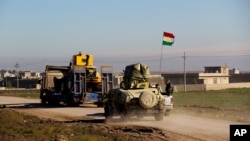A successful midweek offensive by Iraqi Kurdish forces supported by US-led coalition warplanes in northern Iraq against Islamic militants has raised hopes that Mosul, the city seized by the self-styled Islamic State in June, will soon be in the cross hairs. But Western officials are warning that the occupied city is months away from being liberated.
Buoyed by the offensive that saw Kurdish Peshmerga forces sever one of the militants’ major supply lines to Mosul, the Kurdistan region’s security chief, Masrour Barzani, told reporters in Irbil that the militants are feeling “much more heat.” He said the room for maneuver for the Islamic militants had been reduced by an offensive that included 5,000 Peshmerga fighters.
While the Islamic militants' reach has been limited in Iraq, it appears that these highly mobile Islamic State fighters who are able to switch the direction of their attacks from one side of the Syrian-Iraq border to the other, will now be targeting Syrian Kurdish forces.
In London, before an international conference to discuss strategies against the Islamic State, Britain’s Foreign Secretary Philip Hammond cautioned that coordinated airstrikes and military ground offensives by the Iraqi army and Kurds could take years to uproot the militants in Iraq. “This isn’t going to be done in three months or six months. It’s going to take a year, two years,” he said.
Regenerating, re-equipping Iraqi forces
Speaking to the BBC, he said of the Iraqi forces: "We are renewing and regenerating the Iraqi security forces - re-equipping them, retraining them, reorganizing them - but it will be months yet before they are ready to start significant combat operations.”
Conspicuously, Iraqi ground forces were not involved in the Peshmerga action that saw the Kurdish fighters seize a string of villages and a key highway intersection, which hampers the Islamic State supply lines between Mosul and the nearby town Tal Afar.
Kurdish authorities claim that at least 200 Islamic State fighters were killed in a battle that witnessed the militants mount 14 suicide car attacks. Kurdish leaders say they will not move on to Mosul - it isn’t clear they have the strength to do so in any case, say analysts - for fear of provoking Arab resentment. Mosul is outside Iraqi Kurdistan and is predominantly an Arab city.
At first glance, the news of the Peshmerga offensive, combined with further gains by Syrian Kurds in their months-long defense of the town of Kobani on the Syrian-Turkish border, points to significant progress. The Syrian Kurds claim they now control eighty percent of Kobani, where on Thursday a senior IS leader, Safar Harbi, was killed in coalition airstrikes on the eastern part of the town.
Fighters exploiting mobility
But Islamic fighters now appear to be poised to switch their focus, exploiting their mobility and the lack of coordination among the various groups aligned against them. Taking advantage of the breakdown of a non-aggression pact between militia forces loyal to Syrian President Bashar al-Assad and Syrian Kurds, Islamic militants have started to probe territory southeast of Kobani and, according to Kurdish and Western military officials, are massing forces for an offensive on Hasakah.
Capturing that town would help partly to offset the Peshmerga victory this week. U.S. warplanes midweek mounted four airstrikes near Hasakah -- hitting among other targets an IS artillery system, the U.S. State Department tweeted on January 20.
Hasakah is a key town in so-called Rojava, Syria’s Kurdistan, and it straddles roads linking IS-controlled Mosul to Tal Afar and then on to the Syrian town of Raqqa, the de facto capital of the Islamic State. Tensions have mounted in Hasakah, which before the civil war demographically was almost evenly divided between Kurds and Arabs. In recent months the town’s population has swollen to 400,000 with large numbers of refugees flowing in from neighboring regions, adding to sectarian strains.
In November, the leader of the Kurdish Democratic Union (PYD), the dominant group in Rojava, warned of rising sectarian tensions in Hasakah. “The situation is sensitive,” PYD co-chair Saleh Muslim said in a TV interview with a Kurdish channel.
Divisions and rivalry
The deep divisions between the Iraqi government and the Iraqi Kurds and between the Kurdish groups isn’t helping in the fight to push back the Islamic militants, who declared a caliphate across the swath of territory they have captured in Syria and Iraq.
Deep, historical rivalry between the PYD and its parent party, Turkey’s outlawed Kurdistan Workers’ Party (PKK), and the dominant Kurdish party in Iraqi Kurdistan, the Kurdistan Democratic Party (KDP) is hampering progress and coordination.
KDP leaders are suspicious that the PKK is aiming to establish a stronghold in the Sinjar region in western Iraq near Mosul, the home to the minority Yazidis. The PKK established a safe corridor for Yazidis in the face of an onslaught by Islamic militants last autumn when the Iraqi Peshmerga fell back.
“Many believe that the internal Kurdish divisions could benefit the Islamic State group,” warned analysts Wladimir Van Wilgenbur and Vager Saadullah. They note in an article for the website Middle East Eye that squabbling between the Kurds has prevented the recapturing of Sinjar - another key town on supply lines linking Raqqa with Mosul.











